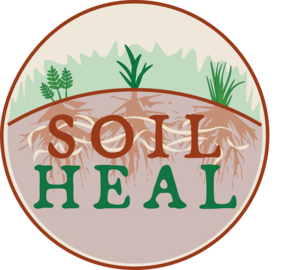SOIL-HEAL
| Start: | 05 September 2022 (External Call project) |
| Duration: | 36 |
| Aim: | Symbiotic Solutions for Healthy Agricultural Landscapes |
| Contact: | Coordinator Dr. David Johnson, The University of Manchester, United Kingdom |

Most plants have coevolved with soil fungi to form root-fungal ("mycorrhizal") symbioses that are critical for regulating numerous ecosystem functions and services. An important feature of mycorrhizal fungi is their ability to form ‘networks’, which (in the broad sense) comprise three distinct elements: extra-radical mycelium, common mycorrhizal networks (CMNs), where a fungus links two or more plants, and community-level ‘interaction networks’ among mycorrhizal plant and fungal species. Despite the potential importance of mycorrhizal symbioses in agriculture, our understanding of the ubiquity and function of mycorrhizal fungal networks and their contribution to resilience of agri-ecosystems is remarkably poor.

Project partners
Country | Organization |
Germany | Freie Universität Berlin |
Ireland | University College Dublin |
Italy | University of Turin |
Call text
Most plants have coevolved with soil fungi to form root-fungal ("mycorrhizal") symbioses that are critical for regulating numerous ecosystem functions and services. An important feature of mycorrhizal fungi is their ability to form ‘networks’, which (in the broad sense) comprise three distinct elements: extra-radical mycelium, common mycorrhizal networks (CMNs), where a fungus links two or more plants, and community-level ‘interaction networks’ among mycorrhizal plant and fungal species. Despite the potential importance of mycorrhizal symbioses in agriculture, our understanding of the ubiquity and function of mycorrhizal fungal networks and their contribution to resilience of agri-ecosystems is remarkably poor. This is especially true under ‘real-world’ field conditions and particularly in response to typical interventions used by farmers and land managers. SOIL-HEAL will fill these major gaps by advancing our mechanistic understanding of fungal networks in agri-ecosystems by determining: i) the properties of interaction networks of plants and fungi; ii) the production and turnover of extra-radical mycelium; iii) the relationships between plant-fungal interaction networks, extra-radical mycelium, CMNs and key ecosystem functions, such as greenhouse gas production; iv) how management interventions influence the extent and function of fungal networks; and v) whether fungal networks enhance the resilience of agri-ecosystems to climate extremes, especially drought, which is expected to increase in frequency and intensity with climate change.
We will focus on grazed permanent grassland systems because of their global extent, importance for agriculture and in providing numerous ecosystem services, and the urgent need for solutions to tackle grassland degradation. Moreover, most grassland plant species form mycorrhizal associations, and a range of management strategies are available to modify the extent and function of fungal networks. Our international collaborative network provides the expertise required to conduct manipulation experiments and field assessments together with cutting-edge isotopic and molecular methods to interrogate mycorrhizal fungal networks and their function. SOIL-HEAL will generate fundamental new knowledge and applied understanding of a critical component of soil biodiversity that regulates numerous ecosystem services, thus addressing Topic B of the call.